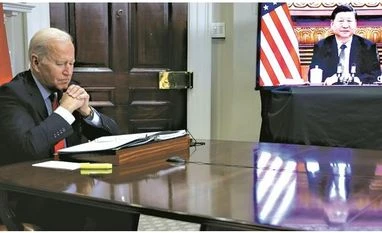US President Joe Biden pressed his Chinese counterpart on human rights in a video call lasting more than three hours, while Xi Jinping warned that China would respond to provocations on Taiwan, according to official accounts of the exchange.
The closely scrutinised conversation between the leaders of the world's biggest economies was described by both sides as frank and direct as the two sides tried to lower the temperature and avoid conflict.
The talks, which began on Monday evening in Washington - Tuesday morning in Beijing - appeared to yield no immediate outcomes, but gave the two leaders opportunity to nudge their relations away from icy confrontation, even as they stuck to entrenched positions.
They discussed North Korea, Afghanistan, Iran, global energy markets, trade and competition, climate, military issues, the pandemic and other areas where they frequently disagree.
Xi, who has not left his country since Covid-19 spread worldwide from the central Chinese city of Wuhan nearly two years ago, compared the two countries to "two giant ships sailing in the sea" that needed to be steadied so they didn't collide, Chinese state media reported.
"I hope that, Mr. President, you can exercise political leadership to return the United States' China policy to a rational and pragmatic track," Xi told Biden, according to Xinhua, a reference to tough-on-China policies that Beijing hoped would be rolled back after Biden came to office.
Biden spoke of avoiding conflict as well.
"It seems to me our responsibility as leaders of China and the United States is to ensure that our competition between our countries does not veer into conflict, whether intended or unintended,"
Biden said during a short exchange observed by reporters at the start of the meeting. "Just simple, straightforward competition."
The leaders had a "healthy debate", a senior US official said afterwards. Biden stressed the importance of China fulfilling its commitments under a trade pact negotiated with Biden's predecessor, Donald Trump, the US official said.
China is lagging in a commitment to buy $200 billion more in U.S. goods and services, but Xi told Biden that it was important to avoid politicising the issue.
The two also discussed taking measures to address global energy supplies, US officials said.
The contentious issue of whether the United States will send White House envoys to the Beijing Winter Olympics in February did not come up, the US official said.
Chinese state media struck an upbeat tone.
"The summit could be taken as a sign that the two economic and political heavyweights could at least avoid a further deterioration in their ties after four years of damage caused by the reckless Trump administration," Wen Sheng, a Global Times editor, wrote in a commentary.
Red line for Taiwan
Sharp differences over the self-ruled island of Taiwan remain.
While Biden reiterated long-standing US support for the "One China" policy under which it officially recognises Beijing rather than Taipei, he also said he "strongly opposes unilateral efforts to change the status quo or undermine peace and stability across the Taiwan Strait", the White House said.
Xi said those in Taiwan who seek independence, and their supporters in the United States, were "playing with fire", according to Xinhua.
Unlock 30+ premium stories daily hand-picked by our editors, across devices on browser and app.
Pick your 5 favourite companies, get a daily email with all news updates on them.
Full access to our intuitive epaper - clip, save, share articles from any device; newspaper archives from 2006.
Preferential invites to Business Standard events.
Curated newsletters on markets, personal finance, policy & politics, start-ups, technology, and more.
)